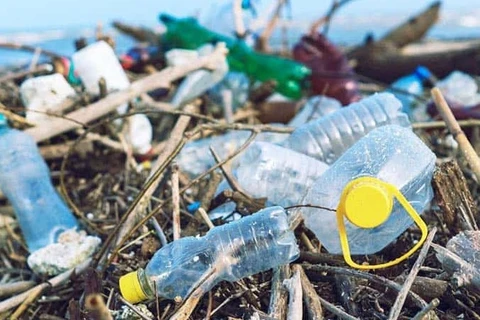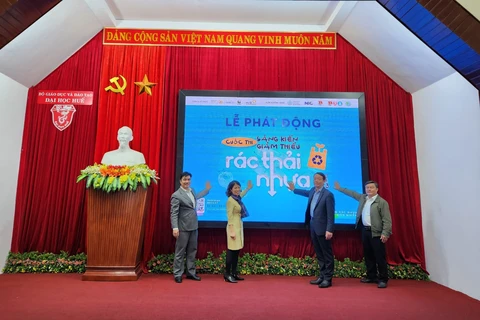 Plogging is a new global movement that originated in Sweden. It is a combination of jogging with picking up litter. (Photo: VietnamPlus)
Plogging is a new global movement that originated in Sweden. It is a combination of jogging with picking up litter. (Photo: VietnamPlus) Hanoi (VNA) – Plastic waste pollution has left a negative impact on the environment and landscape at tourist destinations in Vietnam, and experts said that it’s time to take actions to protect the environment and ensure green and sustainable tourism, heard a seminar in Hanoi.
The amount of plastic waste discharged into the environment at famous tourist destinations has been alarming, said a representative from the Institute for Tourism Development Research (ITDR) and World Wide Fund for Nature (WWF) at a seminar held on April 13 within the Vietnam International Tourism Fair.
About 4 tonnes of waste is discharged every day on average in Ha Long Bay, a United Nations Educational, Scientific and Cultural Organisation (UNESCO) World Heritage Site in the northern province of Quang Ninh.
In the central tourist hub of Da Nang, 17% of the 1,100 tonnes of waste discharged every day is plastic, equivalent to 20.8 tonnes per day.
Plastic waste accounts for 18.31% of the 524 tonnes of daily waste in Phu Yen Province while up to 32.1 tonnes is dumped a day from Phu Quoc island in the southern province of Kien Giang, dubbed the pearl island, accounting for 19% of its total daily waste.
Nguyen Thi Ngoc Anh from the Institute of Strategy and Policy on Natural Resources and Environment (ISPNRE), under the Ministry of Natural Resources and Environment, said that each visitor litters an average of 5-10 plastic bags and 2-4 plastic bottles or milk cartons each day.
The total amount of plastic waste and bags accounts for about 10-12% of the country’s domestic solid waste, especially in some cities with developed tourism activities, she noted.
A report from the United Nations Environment Programme (UNEP) showed that in 2018, Vietnam was one of the countries with the largest amount of plastic waste discharged into the sea, from 0.28 - 0.73 million tonnes per year.
 Children in Sin Suoi Ho commune in Lai Chau province’s Phong Tho district participate in garbage collecting activities. (Photo: VietnamPlus)
Children in Sin Suoi Ho commune in Lai Chau province’s Phong Tho district participate in garbage collecting activities. (Photo: VietnamPlus) Vu Quoc Tri, chief of the Office of the Vietnam National Administration of Tourism, acknowledged that tourism development has left a negative impact on the environment, including plastic pollution, therefore the duty of the tourism industry is to minimise those impacts.
Vu The Binh, Chairman of the Vietnam Tourism Association, said that fully aware of its responsibility, the association has quickly responded to a programme to reduce plastic waste in the industry by calling on tourism businesses to participate in plastic waste collecting and treatment activities.
Nguyen Thi Thu Huyen, country coordinator of the Office of the Global Environment Facility under the United Nations Development Programme (UNDP) Vietnam, said it is necessary for the tourism industry to devise specific plan on reducing plastic waste.
She held that this move is not only meaningful for the domestic tourism environment, but also helps Vietnam respond to international activities in the fight against global plastic waste, specifically towards building a global agreement on plastic waste reduction in the coming years.
To deal with the issue, Binh said his association, in collaboration with the ISPNRE, implements a project to reduce plastic waste in the tourism sector nationwide.
The project will focus on communication activities to raise awareness of sectors, businesses, people and tourists on reducing plastic waste. Initiatives in this regard will be piloted at a number of restaurants, hotels, resorts and tourist attractions in the two provinces of Ninh Binh and Quang Nam, and multiplied across the country.
Other experts said it is essential to develop action plans on reducing plastic waste in the tourism sector such as improving the system of sorting, collecting, recycling and treating plastic waste, promoting campaigns in tourist destinations to call on tourists not to discharge plastic waste into the environment as well as apply strict penalties for offences/.


























